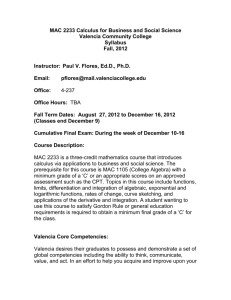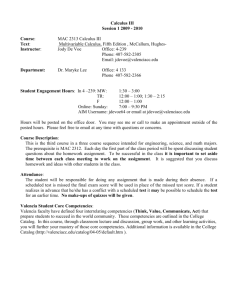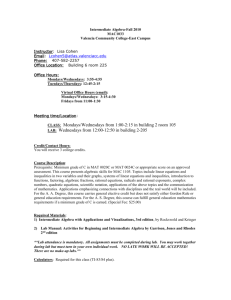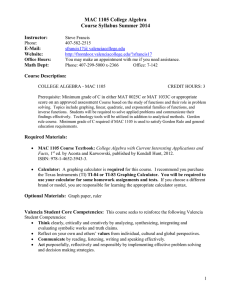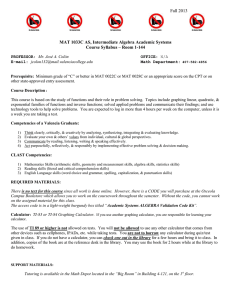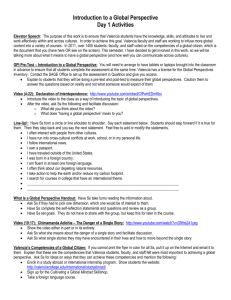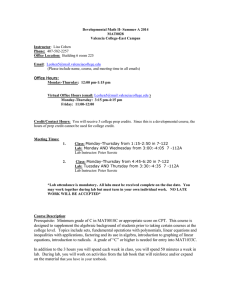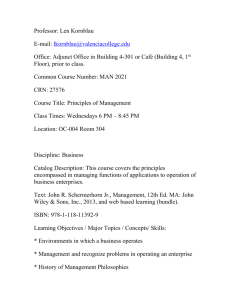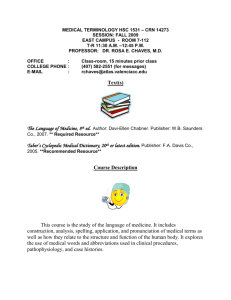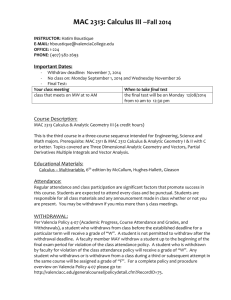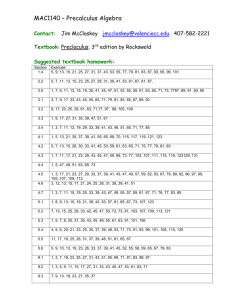sample course syllabus with required sections
advertisement
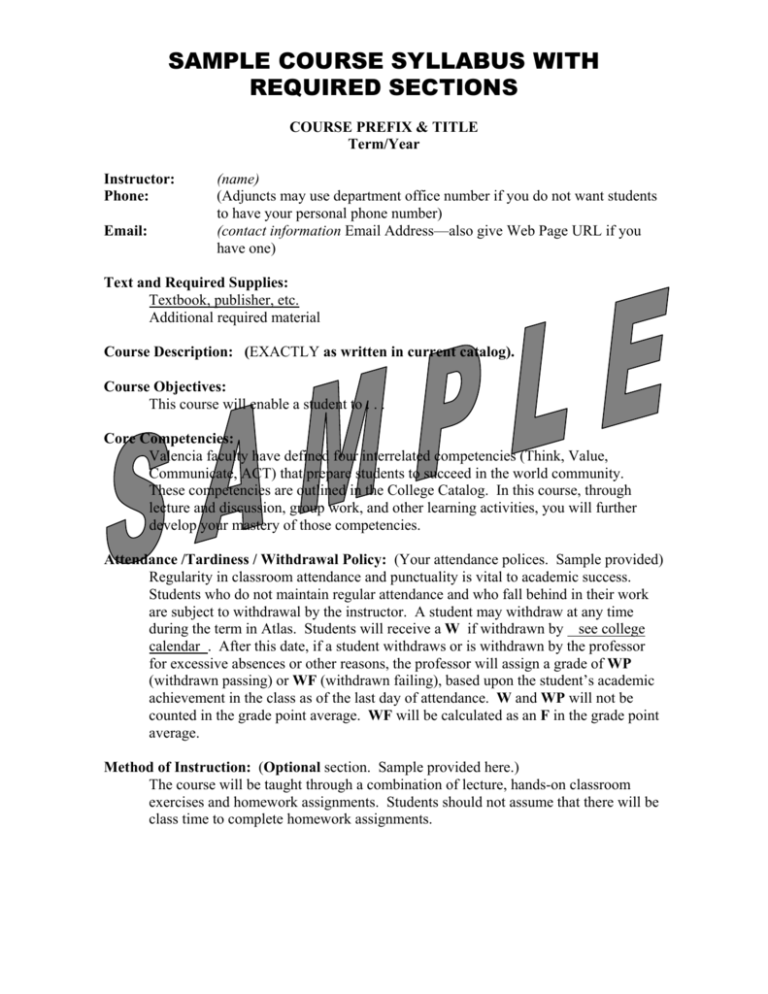
SAMPLE COURSE SYLLABUS WITH REQUIRED SECTIONS COURSE PREFIX & TITLE Term/Year Instructor: Phone: Email: (name) (Adjuncts may use department office number if you do not want students to have your personal phone number) (contact information Email Address—also give Web Page URL if you have one) Text and Required Supplies: Textbook, publisher, etc. Additional required material Course Description: (EXACTLY as written in current catalog). Course Objectives: This course will enable a student to . . . Core Competencies: Valencia faculty have defined four interrelated competencies (Think, Value, Communicate, ACT) that prepare students to succeed in the world community. These competencies are outlined in the College Catalog. In this course, through lecture and discussion, group work, and other learning activities, you will further develop your mastery of those competencies. Attendance /Tardiness / Withdrawal Policy: (Your attendance polices. Sample provided) Regularity in classroom attendance and punctuality is vital to academic success. Students who do not maintain regular attendance and who fall behind in their work are subject to withdrawal by the instructor. A student may withdraw at any time during the term in Atlas. Students will receive a W if withdrawn by see college calendar . After this date, if a student withdraws or is withdrawn by the professor for excessive absences or other reasons, the professor will assign a grade of WP (withdrawn passing) or WF (withdrawn failing), based upon the student’s academic achievement in the class as of the last day of attendance. W and WP will not be counted in the grade point average. WF will be calculated as an F in the grade point average. Method of Instruction: (Optional section. Sample provided here.) The course will be taught through a combination of lecture, hands-on classroom exercises and homework assignments. Students should not assume that there will be class time to complete homework assignments. Exam and Grading Policy: (This section should be specific and should not be changed after the syllabus is given to the students). (Please indicate the grading scale you use. The one given below is an option chosen by many faculty in this department. Use percentiles or points, at your option) 90 – 100% = A 80 – 89% = B 70 – 79% = C 60 – 69% = D Below 60% = F Make-Up Policy for Examinations and All Other Assignments: State your policy, and be sure to include if there are any variations for documented excused absences. Student Conduct and Academic Honesty: (Optional. Although it is optional, many instructors choose to include some guidelines here. Samples listed here.) • Exams and homework are considered individual effort; any submissions that are too similar for coincidence will receive no credit. • Students are responsible for preparing for class by reading pre-assigned readings and completing assignments. Students who are absent are fully responsible for all material covered in class. • Students should bring the textbook, project handout materials, and a diskette to all classes. • Students may collaborate on design and project issues. This does NOT include duplication of programs or designs. Collaboration should be used to find bugs in programs or to solve program syntax and general structure problems. Copying, regardless of the number of editor changes, renaming, and/or retyping is considered cheating, and a student’s inability to describe the function of a submitted assignment will be considered evidence of cheating. All students involved in incidents of cheating will be given a zero (‘0”) for that assignment/quiz/exam/project without regard to who did the original work or who may have benefited. • During exams and quizzes, students may not leave the room or receive phone calls. • The instructor’s phone and email are provided for emergency situations, such as missing an exam, and brief questions about specific assignments. Messages should consist of your name, your class and class time, and a brief message. Questions such as “What did we cover in class?” will not result in a response. Due to the problem of “phone tag”, student phone calls will normally not be returned. Emails with specific questions will be answered as soon as possible, usually within 24 hours. Students who need more than a brief response should arrange a meeting with the instructor. A web site has been set up which contains schedule and assignment information as available. Expected Student Conduct: Valencia Community College is dedicated not only to the advancement of knowledge and learning but is concerned with the development of responsible personal and social conduct. By enrolling at Valencia Community College, a student assumes the responsibility for becoming familiar with and abiding by the general rules of conduct. The primary responsibility for managing the classroom environment rests with the faculty. Students who engage in any prohibited or unlawful acts that result in disruption of a class may be directed by the faculty to leave the class. Violation of any classroom or Valencia’s rules may lead to disciplinary action up to and including expulsion from Valencia. Disciplinary action could include being withdrawn from class, disciplinary warning, probation, suspension, expulsion, or other appropriate and authorized actions. You will find the Student Code of Conduct in the current Valencia Student Handbook. Computer/Equipment Use Policy: (REQUIRED for all classes, since students use the open lab even if they do not have computer access in classroom) • Use of computers in the Business, IT, and Public Services classrooms at Valencia Community College is restricted to those activities designated by the instructor to enhance the class materials. Any other use is strictly forbidden. Inappropriate use includes, but is not limited to: • Use of computer to send E-mail or access Internet sites not specifically assigned in class. • Use of computer for job, internship, homework or other activities not assigned in class. • Modifying any hardware or software system configuration or setting. • Activities not in accordance with the Valencia Student Code of Conduct • Use of computers in the Business Students open lab (Bldg. 2, Room 304) is limited to those activities involved with preparing homework or coursework in the IT or Business departments and is subject to the same restriction as listed above. • Computer use is remotely monitored; any student using computers inappropriately may be subject to dismissal from class or banishment from the lab. Subsequent offense may be sent to the campus administration for further disciplinary action. Students with Disabilities Students with disabilities who qualify for academic accommodations must provide a notification from the Office for Students with Disabilities (OSD) and discuss specific needs with the instructor, preferably during the first two weeks of class. The Office for Students with Disabilities determines accommodations based on appropriate documentation of disabilities. The East Campus Office is located in Building 5, Room 216. Course Schedule: Please include the time frame when you expect to cover objectives, at least in a very general sense. Even if this is developed as a separate document, it should be attached to the syllabus, turned in to the department office for review, and distributed to all students on the first day of class. It does not have to be extremely detailed (although it certainly may be as detailed as the instructor would like), but should give an indication of time spent on various topics. For example: Intro to Basketweaving Weeks 1-3 Selection of weaving materials Weeks 4-5 Historical perspectives of basketweaving Weeks 6-8 Current practices in basketweaving Midterm Weeks 9-12 Practical basketweaving labs Weeks 13-15 Research projects and presentations of findings Final Exam – Date and time Disclaimer Statement (The following is a sample) As many factors may affect the development and progress of a class, the instructor reserves the right to alter the schedule as may be required to assure attainment of course objectives.
